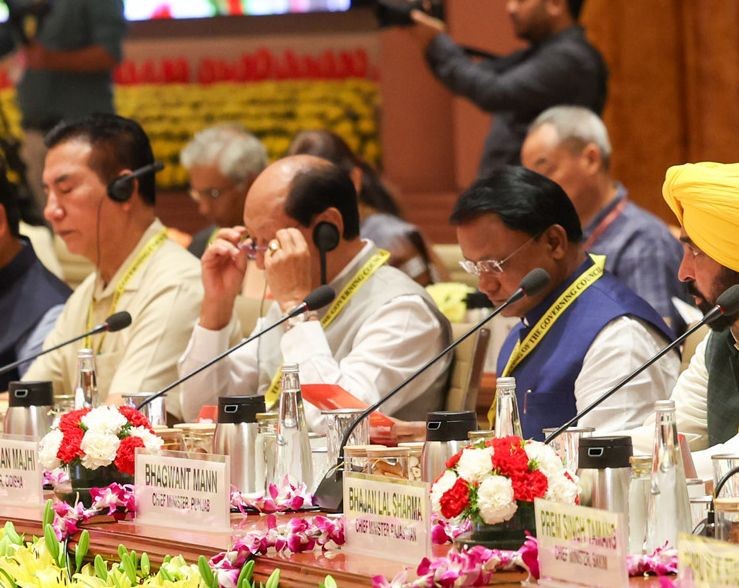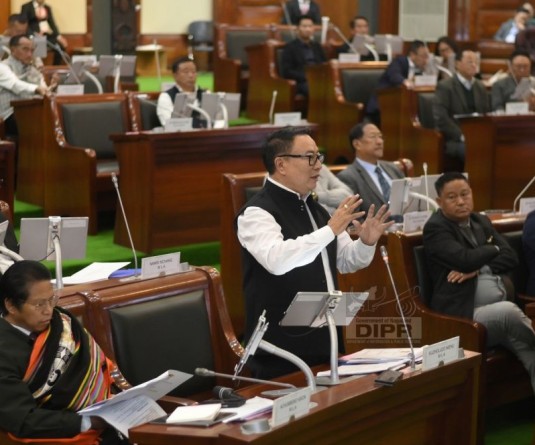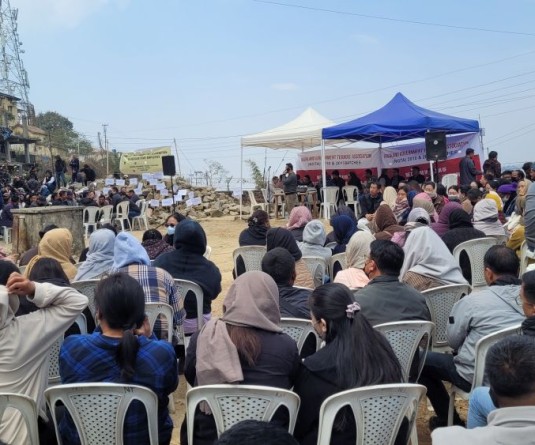CM Dr Neiphiu Rio and others at the 10th meeting of the Governing Council of NITI Aayog, held in New Delhi on May 24. (PIB Photo)

Road-rail-air connectivity, health, education, and urban reforms among key agendas
Morung Express News
Dimapur | May 25
Several key projects, many recurring, were pitched by Nagaland Chief Minister Dr Neiphiu Rio at the 10th meeting of the Governing Council of NITI Aayog, held in New Delhi on May 24.
At the meeting, Dr Rio, while highlighting the chequered political history of Nagaland, noted that it is only in recent years that major infrastructure projects have been undertaken in the State.
However, he underscored that the development deficit of the past decades still persists and highlighted a few ‘critical projects and issues’ pending approval from the Union Government.
The timely realisation of these projects and resolution of these issues would play a pivotal role in the State’s economic growth and regional development, Dr Rio added, listing the projects.
Foothills Road: The Foothills Road or Trans–Nagaland Highway, the proposed 364 km corridor along Nagaland’s border with Assam traversing the mineral and agro-rich foothill belt districts of Mon, Longleng, Mokokchung, Wokha, Niuland, Dimapur, Chümoukedima, and Peren is envisioned as a key economic artery, CM Rio stated.
Over the years, the State Government has been investing in providing road connectivity along this stretch, and in the last financial year, Rs 148.50 crore was allocated in the State Budget for this road, he informed.
However, he noted that the State Government is not in a position to take up a project of this magnitude from its own resources.
Initial talks with the Ministry of Road Transport & Highways (MoRTH) have been positive, subject to land and forest clearances, Dr Rio said, urging the Centre to expedite this strategic road project under central funding, preferably as a National Highway.
The CM also highlighted MoRTH’s decision to recover Rs 120 crore in land compensation awarded by a court verdict from agency charges of centrally funded road projects as “unsustainable and impractical.” He, therefore, urged the Prime Minister’s intervention to ensure ongoing and future projects are not impacted.
Ciethu Airport: The establishment of an airport at Ciethu near Kohima has remained on the State’s wish-list in all such meetings.
On May 24, CM Rio emphasised that Kohima is currently the only State capital in the country without an operational airport, which significantly hampers connectivity and development.
The State Government has acquired 1,013.72 acres of encumbrance–free land at Ciethu, which is adequate to accommodate the landing requirements of Airbus A320–class aircraft, he said.
According to CM Rio, the most recent developments included a Detailed Project Report (DPR) prepared in 2021–22, outlining two implementation options— a 2,750–metre runway suitable for Airbus A320 operations without load restrictions, at an estimated cost of Rs 8,870 crore, and a 2,200–metre runway suitable for Airbus A320 aircraft with load restrictions, at an estimated cost of Rs 5,695 crore.
Highlighting the State Government’s keenness and the strategic location of Kohima, he urged the Central Government to ensure that the capital is brought onto the national aviation map at the earliest.
IISER and NIMSR: CM Rio also stressed the pending establishment of an Indian Institute of Science Education and Research (IISER) in Nagaland, which was announced in the Union Budget of 2015–16. However, the proposal remains unfulfilled to date, he added. In anticipation, the State Government has earmarked 200 acres of land at Sukhovi village in Chümoukedima district.
He thus urged the Central Government to consider the early establishment of IISER Nagaland, as originally envisioned.
CM Rio also highlighted the operationalisation of the Nagaland Institute of Medical Sciences & Research (NIMSR), the State’s first medical college, since September 2023.
However, given the State’s limited capacity to operate such a specialised institution sustainably, he requested the Government of India (GoI) to consider upgrading NIMSR to a Central Institute, similar to the All India Institute of Medical Sciences (AIIMS) or the Regional Institute of Medical Sciences (RIMS).
New High Court Complex: The long-pending construction of the High Court Complex in Kohima also featured in the CM’s speech. He stressed that this vital judicial infrastructure has not received Central support under any existing schemes.
Despite these limitations, the State Government has already invested Rs 242.78 crore, but an additional Rs 299.02 crore is required to complete the project, he added.
He therefore urged that the project be supported under the Special Assistance to States for Capital Investment (SASCI) scheme.
Special Grant for ULBs:
While highlighting the successful conduct of ULB elections in 2024 with 33% reservation for women, CM Rio noted that Nagaland had missed out on crucial urban development grants due to a 20-year gap.
With Municipal and Town Councils now in place, the Urban Development Department has submitted a proposal worth Rs 976.67 crore for comprehensive infrastructure works, he said, urging the Central Government to consider a special grant to support this initiative.
Nagaki City: The establishment of Nagaki City—touted as a “modern, planned incubation city” spanning 39 sq km (3,900 hectares) in the Chathe Valley, Chümoukedima District—was also on the CM’s agenda.
It was conceptualised as a strategic intervention to catalyse economic activity, mitigate unplanned urban sprawl, and create new avenues of employment, recognising the potential of the State’s young and literate population, CM Rio maintained.
For the initial phase, approximately 500 hectares have been earmarked for immediate activation, he added.
To this end, he requested Central Government support through a special financial package to assist in realising the development initiative.
Dimapur–Tizit Railway Line: CM Rio also noted that Nagaland presently has only 8 kilometres of operational railway line in Dimapur, significantly limiting connectivity and logistics capacity across the State.
To address this, the State Government has submitted a proposal for the development of a Dimapur–Tizit Railway Line, spanning approximately 250 kilometres and interconnecting the foothill districts of Dimapur, Wokha, Mokokchung, Longleng, and Mon.
The proposed railway corridor would traverse key mineral and agricultural belts of the State and is envisaged to serve as a feeder route to the Tuli Paper Mill, he said.
Although the project was announced in the Railway Budget of 2011–12, progress has been negligible, he added, calling for the fast-tracking of the project by the Ministry of Railways.
CM Rio also sought special assistance for mineral exploration and development, noting that most resources lie in remote, hilly areas and remain untapped due to inadequate infrastructure and logistical challenges.
Specifically, the State Government seeks the support of NITI Aayog under the Development Support Services to facilitate and expedite the exploration, documentation, and development of the State’s mineral resources.
Special Plan Assistance (SPA): The CM also noted that Nagaland had received a special package of assistance under the erstwhile SPA scheme of the Planning Commission. However, several projects remain incomplete due to the sudden discontinuation of the programme.
As per CM Rio, the current condition requiring at least 50% physical progress for eligibility has posed a challenge for the State. Thus, he requested a waiver of the 50% progress condition in the interest of completing these long–pending initiatives.
At present, there are nine such incomplete projects, for which an amount of Rs 310.29 crore is required. He requested the Central Government to provide one–time financial assistance during the Financial Year 2024–25 to enable the completion and formal closure of these projects.
The vision of Viksit Bharat @2047 must include and be driven by the aspirations of States like Nagaland. With enhanced support, timely approvals, and flexibility in institutional arrangements, the State stands ready to accelerate its journey towards economic self–reliance and inclusive growth, he assured.






